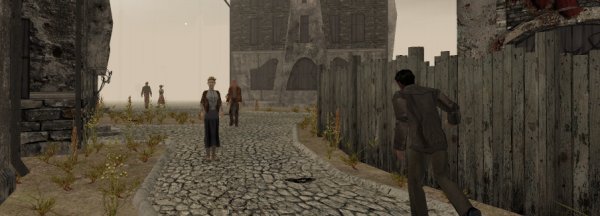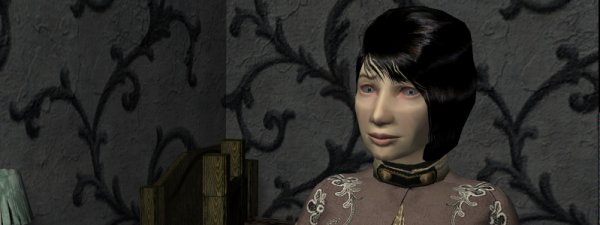RPS Interviews Ice Pick Lodge
And now, in a feature I like to call Forbidden Discourse: The Oily Fruit of the Broken Heart, we present an interview with Ice-Pick Lodge CEO Nikolay Dybowskiy and all-purpose Ice Pick developer Aleksey "the LxR" Luchin. Ice-Pick are of course the Russian studio responsible for the award-winning Pathologic and The Void, two fascinating PC games.
I could give this chat an introduction about how the attitude that comes across in it gives me hope, but screw it. Instead I'll just say that this interview proves just how much these guys are Doing It Right.
RPS: Between Pathologic and The Void it's clear you guys invest almost unheard-of levels of creativity into your games, to the point of making them unlike anything else available today. Where does this drive to be different come from?
Frankly, we never specifically aimed for being not-like-others. What we do began as an attempt at a cultural experiment. Back then, in 2002, we wrote a manifesto, in which we proposed that the computer game is a new, independent form of art with huge and yet unexplored potential.
For us it means primarily that games possesses a unique arsenal of specific “tools” — ones that, unfortunately, we are yet to discover and master — that will allow this artistic form to become the language of the age we live in. We believe that the computer game could become “art of the XXI century” — just like cinema became, to some extent, the primary form of art of the XX century.
And so our studio was born as an artistic laboratory. We decided to set a few experiments — test some ideas, confirm some assumptions and find the artistic tools, unique for the computer game form. Not ones borrowed from the filmmaking industry, painting or literature — but ones based on the uniqueness of playing a game, specific to the form from the very beginning. Ones based on the player’s freedom of choice, irreversibility, non-linearity and pseudo non-linearity of the process in real time… and, of course, many others.
The Russian gaming publications (and some foreign ones) compliment our games for the rare “literature level” of the script, the “artististry” of the visual design and for the ability to use cultural references from movies. But we don’t credit ourselves for any of these. It’s clear that games are a synthetic artform, and therefore attempts to master cultural heritage in order to add “profoundness” to the game might seem like the easiest way. But that’s wrong, proven by the death of post-modernism.
To unlock the true cultural potential of the computer game enormous effort must be put into it, and a huge job done. And here, unfortunately, we didn’t achieve much. But the general feeling of originality (in Pathologic) must have come from the gameplay being oriented towards a catharsis.
RPS: So let's talk discoveries. If Pathologic is or was a grand exercise in decision making, what were the results? And after seven years spent making games, which tools do you think you're starting to understand?
We’re not ready to talk about the results just yet. To harvest and process the result of artistic work there needs to be an important twist or change in your outlook, or you must achieve some new level of maturity.
For now I can only say that the material turned out unsuspectedly and is proving exceptionally difficult and refractory. The root of everything is the player’s freedom of choice. The rich variation in the player’s possible behavior rarely allows us to create “predictable environments and situations” (as proposed by Stanislavsky for the theatre). Frankly, a man is usually not ready to entertain himself — he wants to have a shooting range built for him, then be solemnly led into it, given a gun and offered a variety of targets to shoot at.
In order for the player’s decision to mean anything these “predictable environments” must be directed — and that’s where the turf for research is nearly unlimited. The main idea to keep in mind is that the player must not feel that the game is “working” with the simulation of a player that came before him, but with himself directly — the guy who is actually sitting in front of the monitor. The hero’s problems should derive from the player’s problems. There are no recipes or laws to follow here — everything depends on the setting, the game’s world and the key goal.
For example, in our current game — Tension / The Void — the game begins with the death of the main character (who is never shown or referred too), who was lucky enough for his soul to linger in a strange place called the Void. Our main goal as the developers is to make the player believe that he’s playing the game in order to save his own soul from disappearing completely. And who knows, what really can happen to your soul in real life and what not? ;)
Besides solving this damned problem — the freedom of the player in an “ethically pre-set” setting, the most intriguing directions for research are the flow of real time (the problems of irreversibility of actions) and the potential of Chaos (random events and conditions) within the game world, that, nevertheless, must carry an ethical and meaningful sense.
RPS: One element that links Pathologic and The Void is... not so much an unflinching look at death, because the death in both games never seems meant to shock. The death is just there. Would you put that down to your being a Russian studio?
Catharsis always assumes a vivid death experience. Always. And if you remember Aristotle, the meaning of catharsis is in metamorphosis, in this case the metamorphosis of the gamer. The metamorphose is a “ritual” event that assumes a “small death” of the person that went through it. For a new, enlightened man to be born, the old one has to “die”.
Death itself doesn’t interest us. We're people who quite like life, it's just that some of us are more drawn to the dark side of Existence. And the experience of death in a game is a clear challenge for the player, one that he must stand up to.
It’s quite flattering that our games are associated with Russian national traditions because one of our aims is to build the foundation of the “Russian school” of game development. Culture does exist in the national form, there’s no running away from that. We can’t run away from our history, our language — and, frankly, we don’t want to. It’s the national tradition that defines the unique style of each art form and its individual contribution into the world common tradition.
What’s peculiar is that you tied this to the image of death. Russia is inclined towards dark, solemn thoughts in the fundamental questions of human existence, but I wouldn’t say that the Russian tradition experiences the phenomenon of death as sharply and substantially as the rest of European culture. For example, we never had anything like the “dances macabres” or the Barocco culture. But that’s a subject for another time.
RPS: Okay, well aside from a tendancy towards the sombre what would you say are some of the hallmarks and beliefs of Russian games development? From what I've played I've noticed a fair few of the heavy-handed politcal allegories and spoken debates that populate Russian literature and film.
Actually, compared to the exceptionally rich and vivid traditions of Russian literature and cinematography the contemporary game development is dull, grey and secondary. In my opinion at the moment it's only the Russian studio Phantomery Interactive and the Ukrainian studio Action Forms who dare to experiment with form and content. Andrew
But we don’t feel we have the right to speak for an entire country. One thing is doubtless, which is that there can be no talk of national individuality in Russian gamedev. Not many are interested in it and the major developers cynically sell out to the crowd, taking pride in successfully copying foreign hits. But we hope this is just a matter of the age we live in.
The most important task is to involve the 'thinking' part of the public in gaming and wait for the appearance of intelligent game journalism and criticism. As soon as the average level of intelligence of players and journalists rises, developers will respond immediately.
RPS: More than anything else the design of your games reminds me of the attitude that was so often present in Amiga games - a collection of ideas stitched together, most of them just crazy enough to work. Does your team harbour any disappointment that the rest of the European games industry has grown up to play things so safely?
Of course, one would always want to have a decent artistic competition. I dream of a luxuriant “Renaissance of gaming” when not only the Japanese, but the American, French, English and Russian game industries will create many bright talents, and when players will ask more from the developers — because that’s when our dream comes to life.
Games will find and acquire their own language. And when they do, everyone will have to use it, and thus develop it (neatly paralleling now, when AAA projects feel they have to use stereotypes from other genres). It’ll happen inevitably — it’s just a matter of time. And most likely the decisive factor to this event will be the appearance of a bright personality, a genius of game development, or possibly even more than just that.
But now it looks like the best thing to do is just work and wait for the cultural breakthrough, bringing it closer as best we can, little by little bringing more intelligence to the boundaries of game production. “Dig the soil that the genius will plant seed into”.
RPS: Are there any other large development studios out there that you feel are pushing in the same direction as you? Which is to say, teams focused on learning to use the artistic tools of this new medium instead of leaning on the stereotypes of other genres.
We’ve already mentioned Andrew
Right now we’re waiting for him to wake from his stasis and shock the world with a new revolutionary idea.
RPS: This one's for both Nikolay and Aleksey- what are you favourite games? Or alternatively, which videogames do you each find most inspiring.
Nikolay: My favourite one is Thief: The Dark Project. Others include American McGee's Alice, Metal Gear Solid and the Silent Hill series. I’ve got very good impressions from at least half of the Japanese games I’ve yet encountered (which, by the way, a good example of a national gamedev). And, well, I can't deny it- I love Planescape: Torment and Fallout… But I must note that I only love this games because my life took the path it did, and not because they illustrate our credo.
Aleksey: As for me, I can distinguish the following games: Silent Hill 2 is definitely the best attempt at interactive storytelling, and a very successful one — not many games have managed to repeat its successes. And from what I can say right off my tongue, there's Call Of Cthulhu: Dark Corners of the Earth and that’s about it. I’m also greatly in love with the original Fallouts (1 and 2), Vangers, Perimeter, American McGee’s Alice and… Duke Nukem 3D. You can’t forget the classics that managed to be so revolutionary — I still believe that Duke 3D offers unprecedented levels of interactivity that only some contemporary games manage to achieve. And I’m fascinated by anything Tale of Tales made and will ever make (Hi, Auriea, hi Michael!).
Of course, my favorite games of all are the ones that haven't been made yet. ;) Many concept ideas are wandering in my head, concepts which will hopefully someday be brought to life — maybe a story of a crashed ship with the people you managed to help escape stranded on an uninhabited island (would really like to have A Silver Mt. Zion’s “Mountains Made Of Steam” as part of the soundtrack for this one); or a game about an expedition into the unknown, where one has to keep in mind that his initial resources are the only ones he’ll ever have; or a lyrical fairy tale about a girl who wakes up in a frozen deserted city and realizes that there’s a strange being somewhere here — this one I’ve thought of with my best friend and the one behind the modeling in Tension / The Void, Alexander Jukov.
RPS: When I reviewed Pathologic for RPS the overwhelming response from the people who then went out and bought it was that they could glimpse what you were trying to do, but couldn't bring themselves to face the drudgery and confusion of it and stopped playing after an hour or two. Is that something you were expecting when you made the game?
Aleksey: No, of course not. You see, “Pathologic” is just our first attempt, and it didn’t turn out like it was meant to be in many respects. It’s our lack of experience that stood in the way. The fact that Pathologic was developed as a “uncomfortable” game doesn’t forgive our game design mistakes. Or the horrible English translation, which we, unfortunately, didn’t have much influence over. With Tension/Turgor/The Void we decided to do the English translation in-house and pretty much succeeded — the people who played the Russian with English subtitles were positive about the quality (here I would like to thank hydra9 for all the help he offered with proof-reading and stylistic fixes! Without you, the translation wouldn’t be nearly as good! --- The LxR).
So, if we were to remake Pathologic (and we’re thinking about it) — we’d do a lot of things differently.













